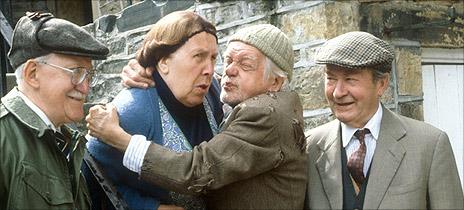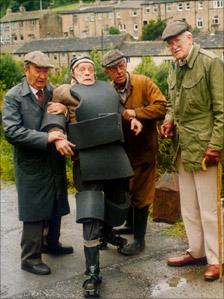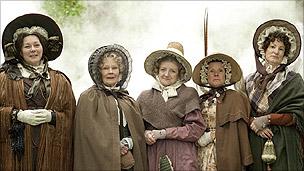What did Last of the Summer Wine teach us?
- Published

Foggy, Nora, Compo and Cleggy became household names
After 37 years of capers from Compo and his pals, Last of the Summer Wine says goodbye this week. One thing it has taught us, says Yasmeen Khan, is that elderly people can still have fun.
Narrow cobbled streets in picturesque villages would ordinarily seem an unnatural place to be cluttered with a film crew, several cameras and mounds of cables.
But growing up in West Yorkshire's Holme Valley, seeing the cast and crew of Last of the Summer Wine filming against the backdrop of the Pennines became a regular fixture of my youth.
Even as a child, however, I realised that one thing differentiated this cast from what I was otherwise used to seeing on the TV - there were no women trussed up in huge dresses for a costume drama, neither was there a young cast dressed in tight jeans and shoulder pads screeching fast cars around the streets.
This cast was older and clad in woolly hats, wellies and tweed. This was picture-postcard England featuring picture-postcard oldies.
Having amassed 31 series over 37 years and put the village of Holmfirth firmly on the tourist trail, Last of the Summer Wine has become the world's longest running sitcom.
The comedy has endured over decades in which tastes in television, programme styles and audience numbers have changed.
Focusing on the misadventures of three elderly men in a Yorkshire village, the classic line up of Compo, Clegg and Foggy - played by Bill Owen, Peter Sallis and Brian Wilde respectively - saw the show through its most successful years.
The show also made an icon of Kathy Staff who played Nora Batty, the wrinkled, stocking-clad object of Compo's affections.
Andrew Vine, journalist and author of a new book about the series, called Last of the Summer Wine, feels that its success is largely down to how youthfully the characters were portrayed by writer Roy Clarke.
"Roy was in his 40s when he was commissioned to write the first episode and he was lukewarm about its premise. But for him the breakthrough came when he stopped thinking about them as old men and started thinking of them as kids; they were all single and free of responsibilities.
"Suddenly it presented a positive image about older people; the characters refuse to accept that their age should be a limitation and that's why the storylines can focus, for example, on the men attempting to use some ridiculous new invention with inevitable comedic consequences.
"Bill Owen maintained that the programme had helped to change attitudes towards older people, while director Alan JW Bell said they had many letters from older people saying how much the show had inspired them to get out and enjoy themselves."
'Natural end'
At its peak in the late 1970s, the programme was hitting between 18 and 20 million viewers, around a third of the available audience at the time.

Youthful antics by older men
In a multi-channel environment where television now competes against entertainment activities including social networking and gaming, it is perhaps surprising that a whimsical show about the elderly has remained on screen for nearly four decades.
Jane Lush, ex-BBC controller of entertainment, feels the show came to a natural end.
"When I was at the BBC, Last of the Summer Wine was barely discussed when it came to recommissioning; it seemed like a staple, a programme that would always be there, like The Sky at Night. But it's inevitable that a show that has run for so long and had so much success, would end at some point."
Last of the Summer Wine's humour is often caper comedy - mention the show and inevitably there will be someone who says it's about bumbling old men accidentally rolling down hills in tin baths.
Taking a sample of other older characters from British comedy of the last four decades, from Steptoe (Steptoe & Son), Captain Mainwaring (Dad's Army), Victor Meldrew (One Foot in the Grave) and Grandad in Only Fools and Horses, they are often depicted as grumpy, eccentric or ineffectual. But Ms Lush believes that old age is not unfairly stereotyped.
"I don't think older people are characterised any differently to other age groups in comedy, after all comedy is about exaggeration. There are many older characters on television that are successful, particularly in comedy.
"Nana from the Royle Family was well-loved, One Foot in the Grave's Victor Meldrew and Catherine Tate's Nan are both fantastic older anti-heroes. In Candy Cabs we have some wonderful older characters, including a woman who uses a mobility scooter.
"Older age is a rich vein for humour; the demise of Last of the Summer Wine does not mean we've seen the last of older people on television."
Despite Andrew Vine's assertion that viewers enjoyed Last of the Summer Wine because of its somewhat whimsical portrayal of older life, television reviewer and star of series Grumpy Old Women, Kathryn Flett, thinks the makers of programmes, including Last of the Summer Wine, still have some way to go in accurately portraying older people.
"Television is still obsessed with youth. There is not enough representation of older people and when they are on screen, they're often presented in a slightly bonkers universe that is heavily tinged with nostalgia, as programme makers seem to assume older audiences are obsessed with the past.

Bonnet sisterhood: How realistic are portrayals of older people on TV?
"It's either that or we have them dying in Casualty or as a matriarchal dame in a costume drama. Older people are in a ghetto of ageism on TV and programme makers are missing a trick."
The show is often dismissed as irrelevant, especially among younger people, yet the final series has pulled in an average of more than four million viewers. For some of them, its appeal has more to do with the richness of the characters than the age of them.
Yet as television bosses are accused of pandering to the tastes of young, affluent urbanites, it may be some time before the sight of elderly men rolling down the Yorkshire hills in a tin bath appears on our screens again.